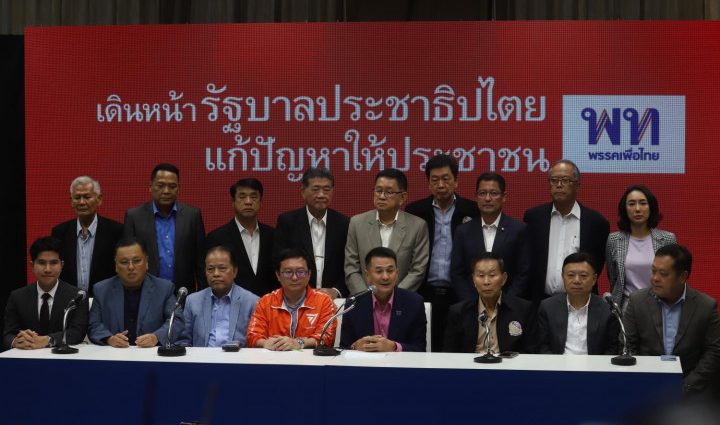Senators press party to leave MFP behind

Even though the Pheu Thai Party is now in charge of forming a government, it will find it hard to secure the support it needs for its PM candidate from senators so long as the Move Forward Party (MFP) remains its coalition ally.
The MFP on Friday announced its decision to step aside and let Pheu Thai have a go at forming a government, even though it remains in the eight-party coalition.
But the senators have insisted that the new government must not support any move to amend Section 112 of the Criminal Code, known as the lese majeste law — one of the MFP’s flagship policies.
In light of this, Pheu Thai will have to tread carefully to ensure its prime ministerial candidate will land the job with the support from senators in the next round of a PM vote next Thursday.
If a PM candidate from Pheu Thai fails to win the post because the MFP is still part of the coalition, it remains to be seen whether Pheu Thai will exclude the MFP from the coalition if it wants to form a new government successfully, according to observers.
Speaking after a meeting of the eight coalition allies at Pheu Thai’s headquarters on Friday, Pheu Thai leader Cholnan Srikaew said the eight parties concluded that they will seek support from the Senate and other political parties outside the eight-party bloc in order to secure enough votes to back Pheu Thai’s PM candidate in the joint parliamentary session next Thursday.
The eight parties will also discuss the conditions laid down by the senators in exchange for their support, Dr Cholnan said.
But if the eight parties fail to gather sufficient support from senators, Pheu Thai will have the freedom to hold talks with parties outside the bloc to seek their backing, Dr Cholnan said.
“Attendees at the meeting also agreed that if the two approaches mentioned before do not work, Pheu Thai will decide what to do next,” he said.
Asked if the MFP had been asked to back down from its plan to amend Section 112, Dr Cholnan said that the issue was raised at the meeting.
MFP secretary-general Chaithawat Tulathon said the MFP wanted to consider the conditions laid down by the senators and that Pheu Thai will hold talks with senators to allay their concerns.
Dr Cholnan also said that several parties outside the eight-party bloc have insisted they will not support a PM candidate from Pheu Thai if the MFP remains in the bloc. Therefore, the meeting decided to give Pheu Thai the right to hold talks with them, he said.
Dr Cholnan added Pheu Thai will nominate only one PM candidate for the vote, and the party is expected to announce who will be the candidate next Wednesday. So far, Pheu Thai has named three PM candidates — Srettha Thavisin, Paetongtarn Shinawatra, and Chaikasem Nitisiri.
Pol Gen Sereepisuth Temeeyaves, a list-MP and leader of the Seri Ruam Thai Party, on Friday said the MFP should make sacrifices by leaving Section 112 alone so a new government can be formed. Seri Ruam Thai is a member of the prospective eight-party coalition.
Senator Somchai Swangkarn on Friday on Facebook congratulated Pheu Thai on its chance to form a government.
He also urged Pheu Thai to give assurances that its PM candidate meets all the qualification requirements and to ensure that all coalition parties in the new government have no policies to support any move to amend Section 112 or to rewrite the constitution in a way that threatens the country’s institutions.
Mr Somchai also wrote that the new government must not issue an amnesty for those convicted under Section 112 and those who committed severe criminal offences, and it must handle the unrest in the deep South without supporting any move to seek the separation of the region from the country.
“If Pheu Thai still cannot reach a conclusion [among its coalition allies], it can ask the parliament president to postpone the session scheduled for July 27 so that everyone involved can think carefully before parliament can finally vote on the country’s 30th prime minister,” Mr Somchai said.
Earlier on Friday, the MFP announced its decision to step back and allow Pheu Thai Party to take charge of forming a government.
With Mr Pita having been blocked twice from being selected, the MFP has now decided to give Pheu Thai the opportunity, Mr Chaithawat said.
In the next parliament meeting on July 27 to select the prime minister, the MFP would nominate a candidate from Pheu Thai for the position, while Pheu Thai could also nominate a candidate of their choice, he said.
Meanwhile, Pornchai Theppanya, an independent academic, on Friday petitioned the Ombudsman to ask the Constitutional Court to rule on whether the parliament’s resolution to reject Mr Pita’s renomination for prime minister was constitutional.

